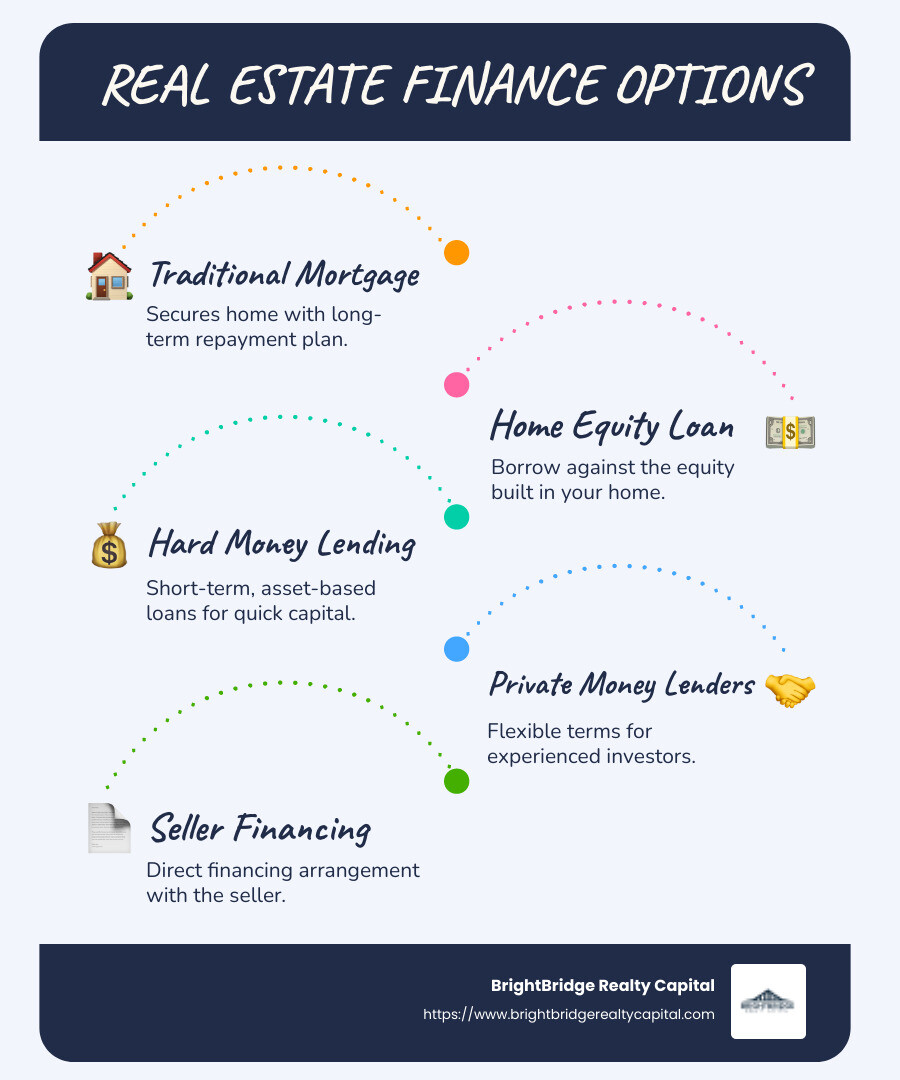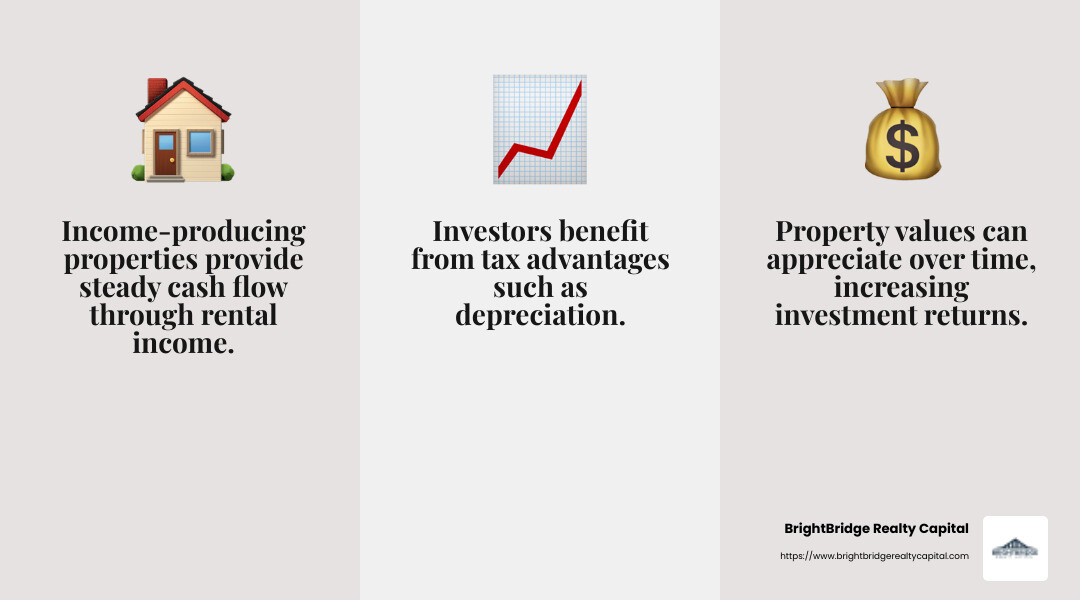Demystifying Real Estate Finance: What You Need to Know

Real estate finance is all about securing the money needed to buy or invest in properties. Whether you're seeking to expand your rental portfolio or flip houses for profit, understanding real estate finance can be the key to success. It involves a variety of funding options, complexities, and strategies that can make or break your investment aspirations.
Key Points About Real Estate Finance:
- Types of Properties: Includes residential (homes, condos) and commercial (offices, retail spaces).
- Financing Options: Range from traditional mortgages to innovative private lending solutions.
- Investment Strategies: Focus on maximizing profit while managing risk and cash flow.
- Benefits: Offers opportunities for portfolio diversification and tax advantages.
For investors battling slow loan approvals and high rates, having a grasp on real estate finance means being able to swiftly seize opportunities with competitive, flexible financing. Whether it's through traditional bank loans or alternative routes like hard money lending, informed choices open pathways to lucrative real estate gains.

Easy real estate finance word list:
Understanding Real Estate Finance
Real estate finance is the backbone of property investment, guiding how investors secure funding and manage cash flow. Let's break down the essentials:
Methods of Real Estate Valuation
Valuation methods are crucial in real estate finance. For commercial properties, the capitalization rate is a popular choice. This method calculates a property's value based on its income potential, determined by the net operating income (NOI). A higher NOI means a more valuable property.
For residential properties, valuation typically involves:
- Fair Market Value: Used to set a selling price, considering factors like location and amenities.
- Appraised Value: Calculated by licensed appraisers, often used for securing loans.
- Assessed Value: Determines property taxes, set by local tax assessors.
Sources of Real Estate Financing
Securing real estate financing can be done through various sources, each with its own benefits:
- Traditional Bank Loans: These include fixed-rate and adjustable-rate mortgages.
- Government-backed Loans: Options like FHA and VA loans cater to specific needs.
- Alternative Financing: Includes hard money lenders, private lenders, and peer-to-peer lending.

Income-Producing Properties
Investing in income-producing properties is a common strategy in real estate finance. These properties, whether commercial or residential, generate revenue through rent or leases.
Key Benefits:
- Steady Cash Flow: Regular rental income can provide financial stability.
- Appreciation: Over time, property values can increase, boosting investment returns.
- Tax Advantages: Depreciation and other tax benefits can improve profitability.

Understanding these aspects of real estate finance helps investors make informed decisions, ensuring they can steer the complexities of the market and capitalize on opportunities for growth and profit.
Next, we'll explore the various financing options available to investors and how they can leverage these to achieve their real estate goals.
Common Real Estate Financing Options
When it comes to real estate finance, there are numerous options available to investors. Each option has its own set of benefits and requirements. Let's explore some of the most common ones:
Traditional Mortgage
A traditional mortgage is a popular choice, especially when interest rates are low. It's a long-term loan where the property itself serves as collateral. To qualify, you'll need a good credit score and a down payment.
Home Equity Loan (HELOC)
If you have equity in a property, a Home Equity Line of Credit (HELOC) lets you borrow against it. This can be a flexible way to finance new investments or renovations. Your home is on the line, so use it wisely.
FHA Loan
Backed by the Federal Housing Administration, FHA loans are ideal for those with lower credit scores or smaller down payments. These loans make home buying accessible to more people.
Conforming Loan
Conforming loans must adhere to limits set by the Federal Housing Finance Agency. They offer good terms but are capped at certain amounts, which vary by location.
203K Loan
This is perfect for those looking to buy and renovate older properties. Backed by the FHA, a 203K loan finances both the purchase and the rehab costs.
Portfolio Loan
Portfolio loans are kept by the original lender rather than sold on the secondary market. This often leads to more flexible terms and a closer relationship with the lender.
Lease to Buy
A lease-to-buy agreement allows tenants to rent with the option to purchase the property later. It's a practical choice for those who need time to secure financing.
Cash Financing
For those with access to capital, cash financing means buying property outright. This eliminates loan payments and can make your offer more attractive to sellers.
Hard Money Lenders
These are short-term loans often used by those rehabbing properties. They come with higher interest rates and fees but are quicker to obtain, making them popular for flipping houses.
Private Money Lenders
Borrowing from private individuals, often through personal connections, can be flexible but may strain relationships. Terms vary widely, so clear agreements are crucial.
Self-Directed IRA Accounts
Investors can use self-directed IRAs to finance real estate while deferring taxes. Be cautious, as early withdrawals can incur penalties.
Seller Financing
In seller financing, the buyer makes payments directly to the seller. This can speed up the process and reduce bank-related costs, but requires trust between parties.
Peer-to-Peer Lending
Peer-to-peer lending platforms connect borrowers with individual lenders. This method can offer competitive rates and terms custom to both parties' needs.
VA Loan
Available to military veterans and their families, VA loans offer favorable terms like no down payment and no private mortgage insurance, making homeownership more accessible.
Understanding these real estate financing options allows investors to choose the best fit for their goals and circumstances. Next, we'll explore the role of real estate finance in investment strategies, focusing on diversification, cash flow, and tax benefits.
The Role of Real Estate Finance in Investment
Real estate finance plays a crucial role in shaping investment strategies. It helps investors diversify, manage cash flow, and enjoy tax benefits. Let's look at each of these aspects.
Diversification
Investing in real estate allows for diversification, which spreads risk across different types of properties and locations. By including real estate in your portfolio, you can balance the volatility of stocks and bonds. This strategy can help protect against market downturns, as real estate often behaves differently than other asset classes.
Cash Flow
One of the main attractions of real estate investment is the potential for steady cash flow. Rental properties can provide a regular income stream, which can be reinvested or used for personal expenses. This cash flow can be more predictable than stock dividends, making it an appealing option for investors seeking stability.
Tax Benefits
Real estate investment offers several tax advantages. Investors can deduct mortgage interest, property taxes, and even some operating expenses. Additionally, depreciation allows for a non-cash deduction, which can reduce taxable income. These tax benefits can increase the overall return on investment.
Real estate finance supports these strategies by providing the necessary capital and structuring options. Whether through a traditional mortgage or creative financing methods, understanding the financial tools at your disposal is key to maximizing the benefits of real estate investment.
In the next section, we'll dig into real estate finance strategies for investors, focusing on risk management, credit requirements, and down payments.
Real Estate Finance Strategies for Investors
When diving into real estate investment, understanding real estate finance strategies is crucial. Let's explore key elements like risk management, credit requirements, and down payments.
Risk Management
Investing in real estate involves risks, but smart strategies can help manage them. Diversifying your property types and locations can spread risk. For example, owning both residential and commercial properties can balance market fluctuations.
Another strategy is to keep a cash reserve. This can cover unexpected repairs or vacancies, ensuring your investments remain stable.
Monitoring market trends and economic indicators can also guide your investment decisions. Staying informed helps you anticipate changes and adjust your strategy accordingly.
Credit Requirements
Your credit score plays a significant role in securing financing. A higher score often means better loan terms. To improve your credit score:
- Pay bills on time: Consistent payments boost your score.
- Reduce debt: Aim to keep your credit utilization below 30%.
- Limit new credit inquiries: Too many can lower your score.
Lenders look for scores of 620 or higher, but a score above 740 is ideal for the best rates. Regularly reviewing your credit report can help catch errors and improve your score.
Down Payments
Down payments are a critical part of real estate finance. They affect your loan terms and investment return. Typically, investment properties require a higher down payment—often 20% or more.
Having a larger down payment can:
- Lower your monthly mortgage payment
- Reduce loan interest rates
- Increase your equity in the property
Saving for a substantial down payment might require time, but it can significantly impact your investment's success.
In the next section, we'll tackle frequently asked questions about real estate finance, including the methods and sources of securing financing and opportunities for learning more.
Frequently Asked Questions about Real Estate Finance
What is real estate financing?
Real estate financing is the process of securing funds to purchase property. This can apply to both residential and commercial properties. At its core, it involves finding the right method and source to fund your property purchase.
Methods of real estate financing vary widely. The most traditional is a mortgage loan, where a bank or financial institution provides funds in exchange for interest payments over time. Other methods include cash financing, where the buyer pays the full amount upfront, and more creative options like seller financing or lease-to-buy agreements.
Sources of real estate financing can also differ. Banks and credit unions are common sources, but private lenders and investment groups offer alternatives, especially for those seeking non-traditional financing options.
What are some of the most common ways to secure real estate financing?
Securing real estate financing often starts with understanding the different types of loans available. Here are some of the most common ways:
Bank Loans: Traditional bank loans are the most common, with fixed or variable interest rates. These loans typically require a good credit score and a down payment.
Cash Financing: Some buyers choose to pay in cash, eliminating the need for a loan. This can speed up the buying process and avoid interest costs.
Private Lenders: These include individuals or groups willing to lend money for real estate investments. They often have more flexible terms but might charge higher interest rates.
Each option has its pros and cons. For example, while bank loans are stable and predictable, private lenders can offer more flexibility, especially for those with less-than-perfect credit.
What opportunities are there to learn more about real estate finance?
Learning about real estate finance is crucial for making informed investment decisions. Here are some resources and opportunities to expand your knowledge:
Courses: Universities like the University of San Diego offer courses focused on real estate finance. These courses cover everything from basic concepts to complex financing strategies.
Guides and Resources: Websites like Investopedia provide comprehensive guides on real estate financing. These resources can help you understand different financing options and how to evaluate them.
Books and Articles: Reading up on real estate finance through books and articles can also be valuable. Look for works by industry experts to gain insights into market trends and strategies.
By leveraging these resources, you can deepen your understanding and make smarter investment choices. In the next section, we'll conclude our discussion by highlighting BrightBridge Realty Capital's unique offerings in the real estate finance landscape.
Conclusion
At BrightBridge Realty Capital, we understand that every real estate investor has unique needs. That's why we offer customized financing solutions designed to meet those needs. Our focus is on providing fast closings, often within a week, to help you seize opportunities without delay.
Our direct lending approach means we cut out the middleman, offering you competitive rates that are hard to beat. This not only speeds up the process but also ensures a seamless experience from start to finish. Whether you're flipping properties, building new constructions, or expanding your rental portfolio, we have the expertise and flexibility to support your investment strategy.
Choosing the right partner in real estate finance is crucial. With our nationwide reach and commitment to excellence, we are here to help you achieve your investment goals. Explore our services to see how we can support your real estate journey.
By partnering with BrightBridge Realty Capital, you're not just getting a lender—you're getting a team dedicated to your success.


